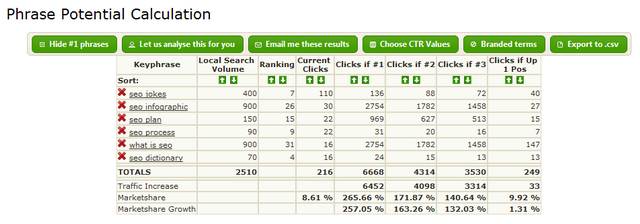
CTR, or for those of you new to internet marketing terms, Click Through Rate, is a very useful metric we rely on heavily in the SEO and internet marketing world. CTR is useful for figuring out keyword potential for organic searches and to measure the success of our ad campaign in paid search. I talked about mistakes SEOs tend to make in my last post here on SEP, one that I didn't mention is that a great number of SEOs think and convince their clients that SEO is about rankings. While that is partially true, it is mostly dependent on one other factor closely tied to rankings, and that is conversion of the ranking keywords.
With higher rankings our conversions improve, but some keywords that have high search volumes are not well converting keywords, and that is the part that separates good SEOs from the rest. Researching and finding high converting keywords is the first step to a successful SEO campaign. The job of a SEO strategist is to improve the total ROI of his clients, and the fastest way to that goal is trough highly convertible keywords, which is why we need to understand CTR and CTR prediction, to know which keywords to target and push forward.
The biggest problem now is that CTR is getting harder and harder to predict for organic searches. For advertising campaigns you can see all the data in your Adwords dashboard and Google and other search engines offering advertising will gladly share their data in order to get you to pay more for top placement, so that is not a thing to worry about. But for organic search you can either depend on SEO industry leaders to give you CTR numbers, which are a rough estimate, or you can do your own CTR predictions on client to client basis.
What makes it hard for CTR to be predicted correctly for organic search? Well, there is a number of factors involved, first of all it requires plenty of time and resources, a great number of keywords samples, and then comes the difficult part. You have to account for variations in different markets, websites, each keyword converts differently, of course Google Instant lowered the CTR with the 3 seconds rule and there is personalization to take into account, which is impossible most of the time. Its not just that, you have to consider CTR changes based on region and language, so at best the global CTR numbers we get from research companies each year are well educated guesses, but that is what makes them predictions, its like predicting the weather, you have some factors to account for and you can make an educated guess, but it doesn't mean it will be 100% right.
Benefits Of Knowing CTR For Top 10 Positions
But even though we cannot be 100% accurate it gives us a greater insight into keyword potential. At Dejan SEO we developed a free tool to calculate keyword potential which you can use to find keyword that can improve your ROI. It works on a pattern you can use yourself to manually predict and calculate CTR for your own websites using data from Google Webmaster Tools.
On a grand scale, global CTR prediction is a really tough process; we described some of it above, this article about CTR prediction using keyword clusters may give you a bit more insight, but don't be discouraged if you don't get it at first. On a website scale that is a simple process, you can find out the CTR for your keywords in GWT, find the real ranks for those keywords, GWT shows average ranks, and based on average CTRs for positions you can roughly estimate the potential of those keywords. You can of course use our tool to that, it uses our CTR percentages based on our CTR study, but you can use other like the recent one from Slingshot SEO. The point is that 5 companies doing CTR research studies will get different results, based on all the factors mention in this article, but that is not all that important as the numbers will not differ too much in most studies. That will help you find the keywords that will convert more and improve your online business and investments.
CTR is very important for our keyword research methodology, without it we wouldn't be able to achieve success with our websites through proper keyword targeting. If you dont find that to be true you can end up chasing your own tail by pushing trophy keywords that will do you no good.
See also:
